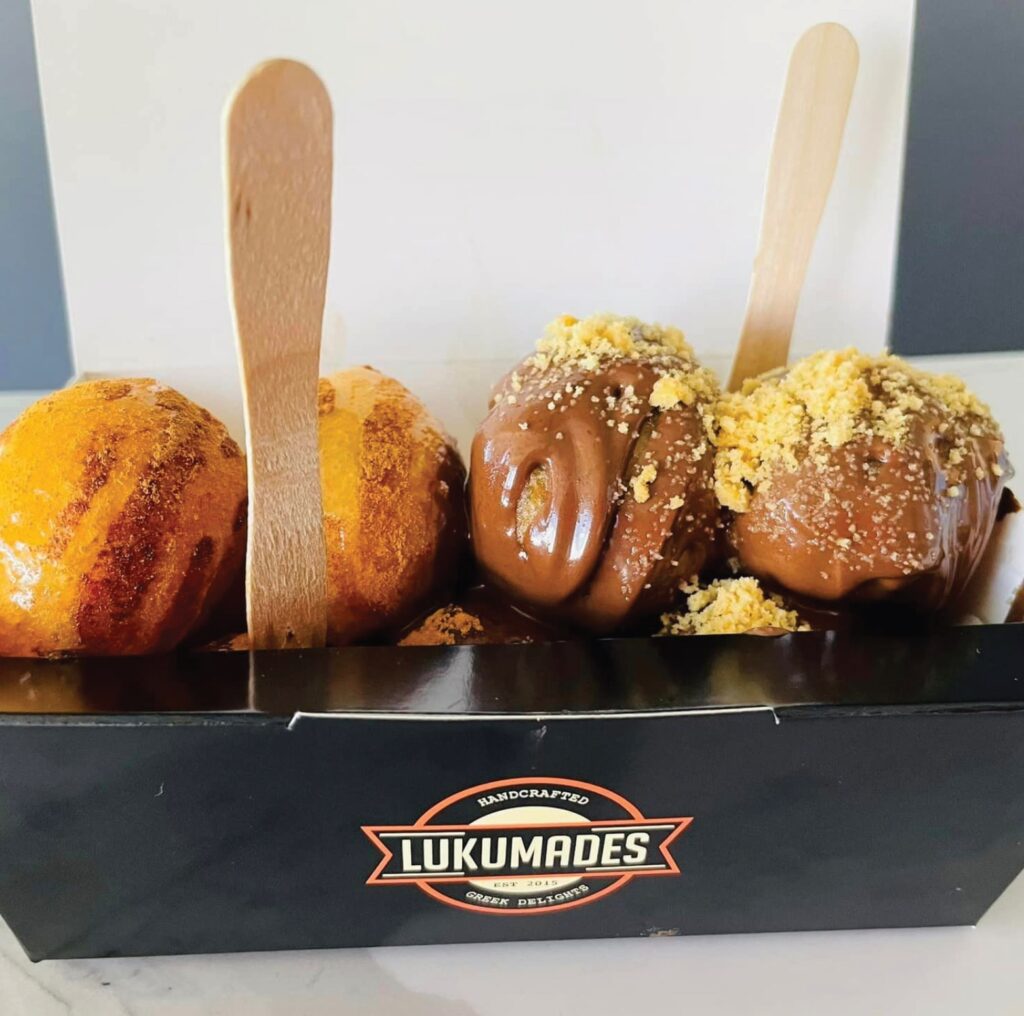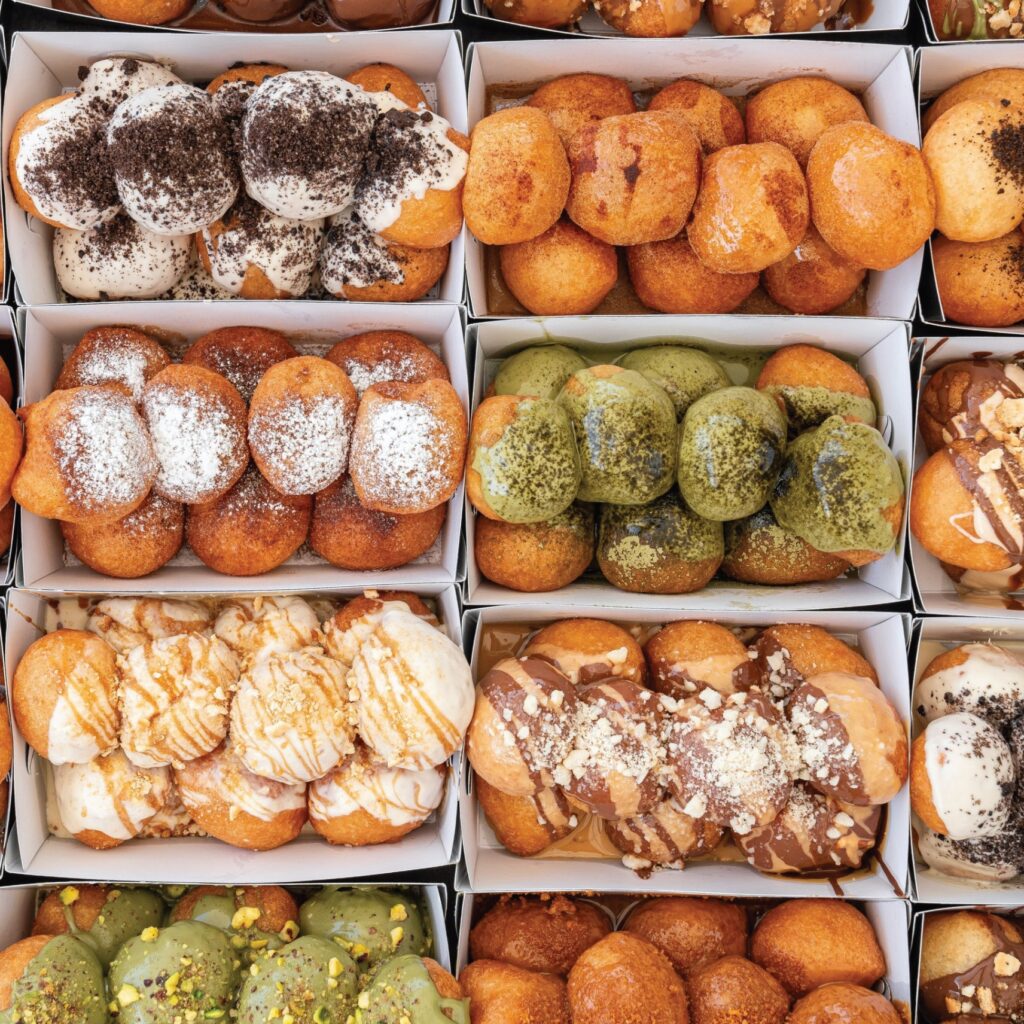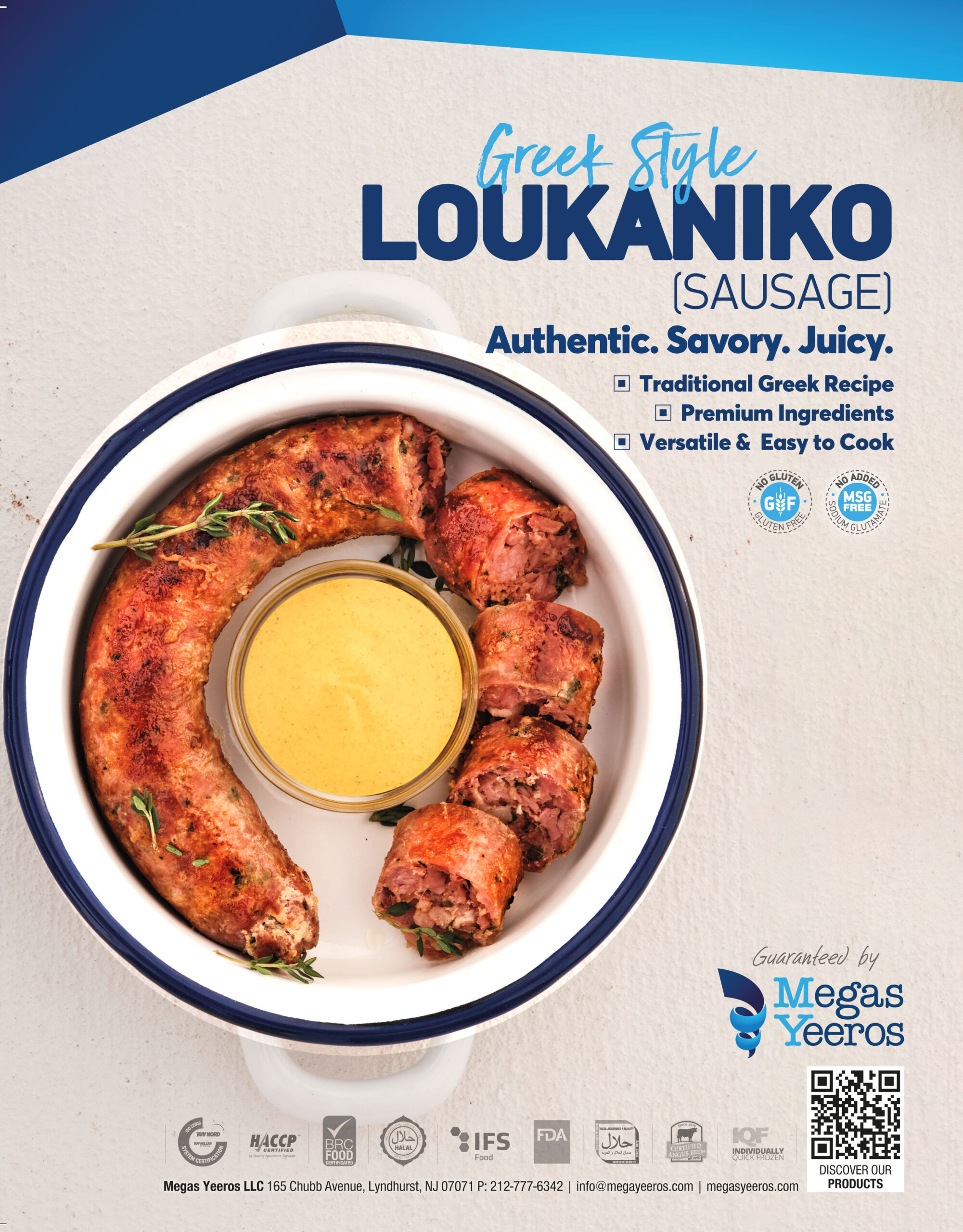The New Greek Imports
Posted by estiator at 13 July, at 13 : 16 PM Print
COVER STORY
Concepts born in Greece are planting a flag in the U.S.
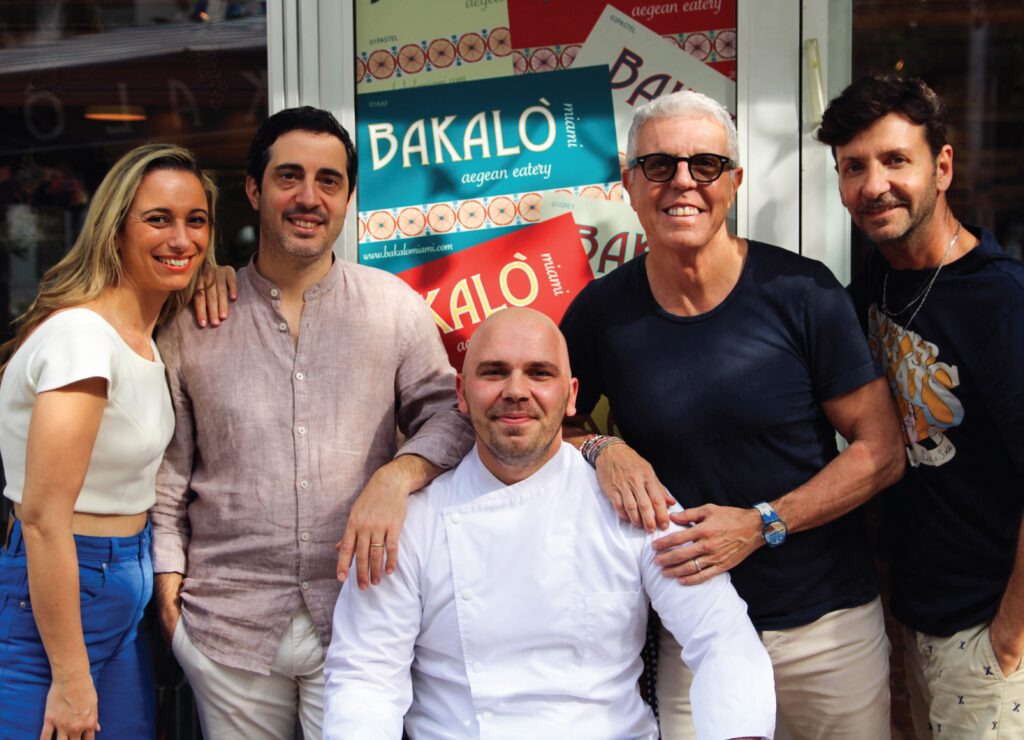
By Michael Kaminer
As American restaurant brands expand massively overseas― a new KFC location opens somewhere in the world every 3.5 hours, according to Nation’s Restaurant News― it’s refreshing to hear that two Greek-born food concepts are reversing the tide by planting a flag in the U.S.
And while they couldn’t be more different, both of these new businesses reflect a stronger-than-ever interest in Greek cuisine― and its continual mainstreaming into American palates.
“Greek cuisine is up and coming, and while there are good Greek restaurants in Miami, we thought there was room for more,” says Nikos Nanou, a partner in Bakalo Mykonos, which opened in April in South Beach.
The 60-seat restaurant is not the first hospitality venture for Nanou and partner Egidio Guerreri. The pair ran one of Mykonos’s hottest eateries, also called Bakalo, until the summer of 2023. Opened in 2010, their unassuming, unpretentious restaurant became a haunt for A-list celebrities including Sofia Vergara, Gloria Estefan, and Calvin Klein.
After selling Bakalo last year, Nanou and Egidio set their sights on the States. “We’ve been spending winters in Miami, like snow-birds, for more than20 years,” Nanou tells Estiator. “We had always thought about doing some-thing here, so when the opportunity came up and we found a location in a neighborhood we liked, we decided to move forward.”
Their menu takes inspiration from their Mykonos spot but doesn’t replicate it.
“Our product is based on simple, homey Greek cuisine with a bit of a twist, but not over the top,” Nanou says. “It’s accessible, and that applies to prices as well― we’re mid-range, and priced to become an every-day restaurant. We’re fortunate that our location, in a quite residential neighbor-hood, is also easily accessed.”
What the duo will bring from their previous business is high-touch hospitality that brings a human element, and warmth, to every customer encounter.
“We pay attention to the service as much as the food,” Nanou says. “What made us successful in Mykonos is that personal touch. We had noticed all these years, spending time in South Florida, that service can be correct, but there’s a personal note missing sometimes. We used to go back to places time after time, but would not get even a ‘Welcome back’ or ‘How are you today?’ Those are the little things that make you smile. And that’s probably why we had so many celebrity customers. And this was before Instagram and social media.”
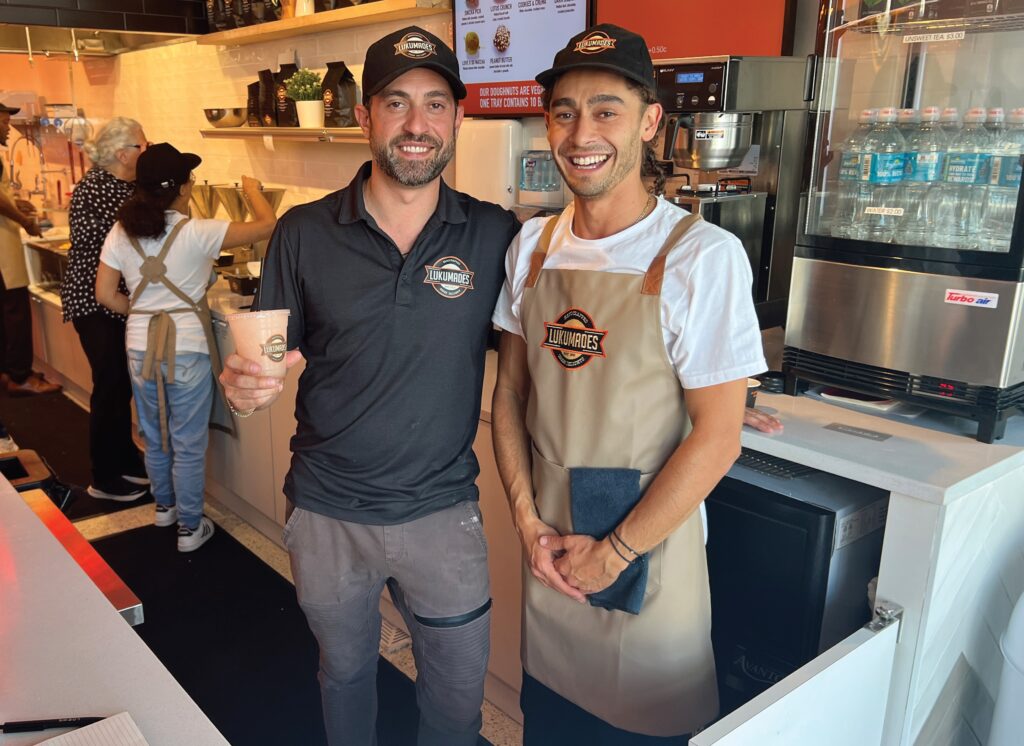
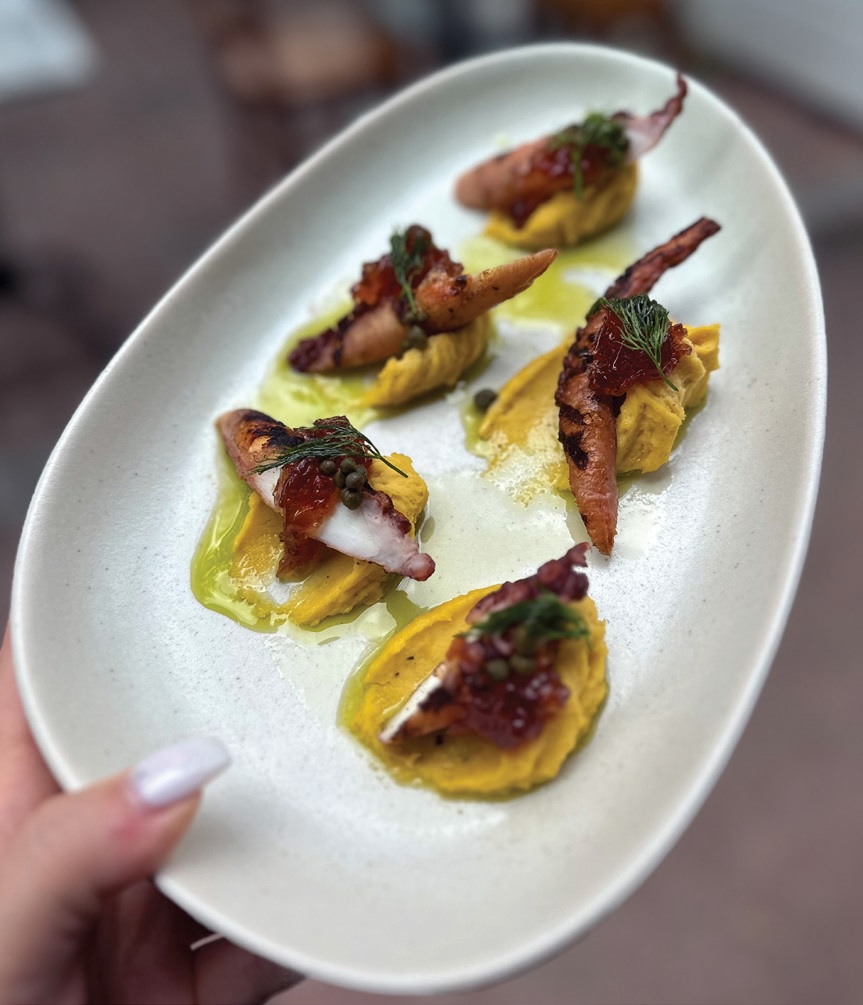
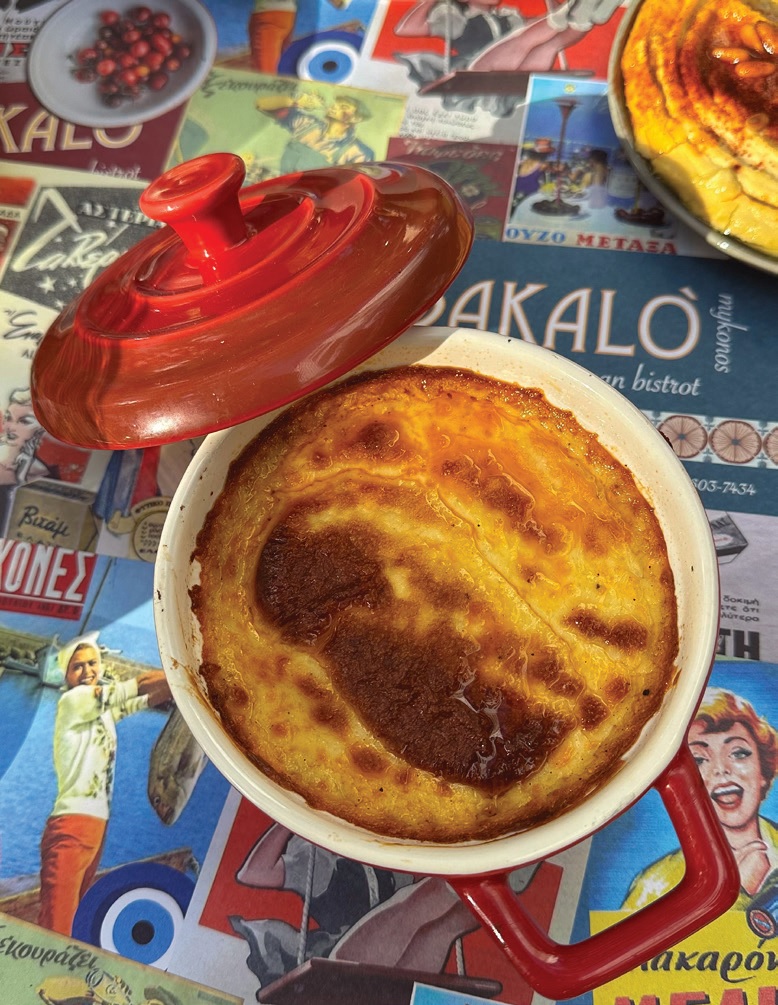
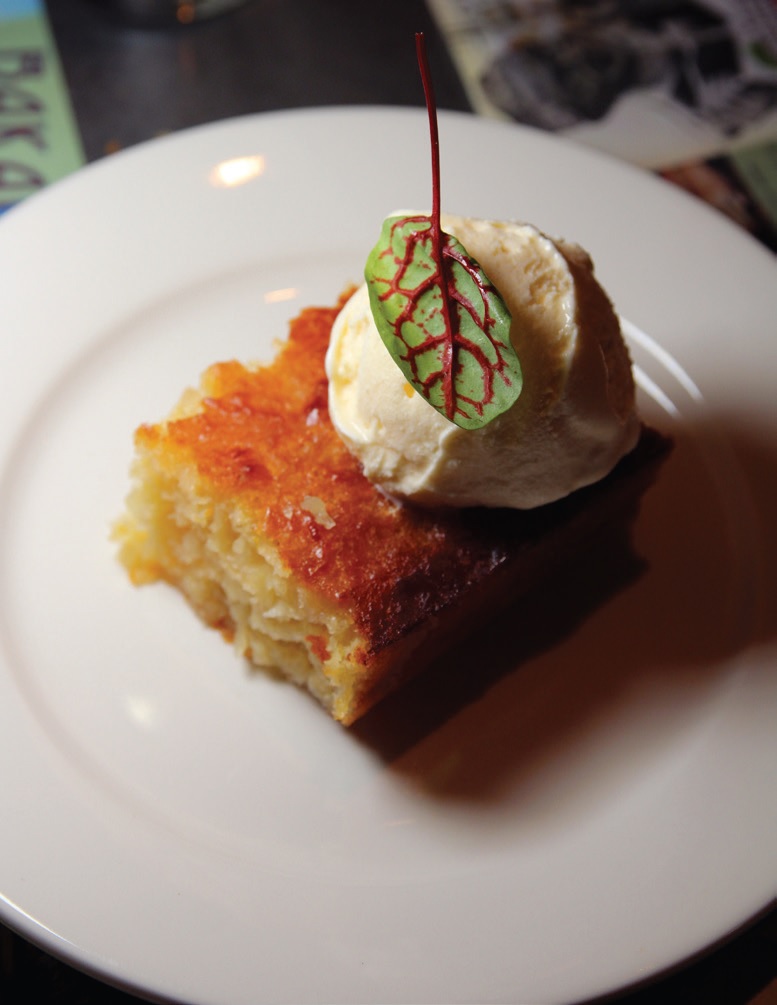
With indoor-out-door seating, the light-filled restaurant features a partly open kitchen. “People can see the chef and say hello,” Nanou says. “And we’re always there, since we run the business.” For decor, Nanou and Guerreri sourced original Greek advertising signs from Athens flea markets; chairs, all vintage, come from French bistros.
“We wanted the room to feel like a Greek bistro from the1950s or ’60s, which was the original concept of Bakalo,” he says. “Our name, in fact, comes from the Greek work ‘bakalotaverna’, which was like a drugstore in the ’30s, ’40s, and ’50s, where you’d go for everyday shopping but would also find a couple of tables for something to eat.”
Signature dishes include moussaka―“always a classic,” Nanou says―along with grilled octopus with Santorini split fava and lobster giouvetsi, “a spin on a dish usually made with beef,” he says. While Bakalo Mykonoshasn’t yet received a liquor license, the restaurant offers beer and wine, along with a Bakalo Spritz based on Otto’s Athens Vermouth, a Greek product. “We can sell it because it doesn’t have a high alcohol concentration,” Nanou says. The menu also features Fix Hellas, the oldest Greek beer brand, the Greek IPA called 8th Day, and wines including Assyrtiko Santorini and Moscofilero whites and an Agiorgitiko red.
While Nanou say she and Guerreri have been “very happy with the result “of their first U.S. restaurant, “we’re running into an issue that’s not so different from Europe—staffing,” Nanou says. “It’s not that easy to hire, and there’s a shortage of people. We’re fully staffed, though, and the two of us are always present in case we need to step in.”
About 356 miles north, brothers Leo and Gio Georgallis are familiarizing their neighbors in Jacksonville Beach, Florida, with another Greek concept.
In May, the pair opened the first U.S. location of Lukumades, which sells “always hot and fresh” mini-donuts that are a staple of traditional Greek cuisine.
Locals have been thrilled with the shop’s arrival. “We soft-opened, with a bit of promotion on social media, and the response has been great. We’re getting busier and busier,” he says. “We were on the local news for National Donut Day, June7, and there was an instant response. It aired at 9 a.m., and by 11 a.m., people came by saying, ‘I saw you on the news and had to check it out.’ The other day, the whole local Greek church came in.”
Founded by Greek-born entrepreneur Exarhos Sourligas in 2015, Lukumades started as a food truck in Melbourne, Australia. Leo Georgallis, who befriended Sourligas during summers, spent working in Greece as a teen, “always wanted to do something with him because of his great ideas, his attention to detail, and just the way his mind works,” Georgallis told a local newspaper.
Lukumades has expanded rapidly, opening nine stores in Australia and 13 locations glob-ally, including in the United Arab Emirates, Tai-wan, Singapore, and now the U.S. “Grab-and-go has grown quickly since Covid, so this concept feels like a good bet,” Georgallis tells Estiator.
“Lukumades is street food that’s easy for customers to come in and take with them, along with coffee or our house-made gelato, ”he says. “Plus, we’re on the beach here, and you’re always on the beach in Greece. Most importantly, the concept is dear to me because of my family roots in Greece.” Georgallis’s father was born in Kos; his mother’s side hails from Kalamata.
Born in Jacksonville, Georgallis spent “every summer” in Greece; as a teen, he would spend as many as 10 months out of the year there. “I loved the way of life there, and Lukumades taps into that―the way they drink coffee, how they enjoy dessert in the middle of the day.” Lukumades’ fried balls come in flavors including honey, cinnamon, caramel, matcha, and maple syrup; the shop also serves coffee drinks, milk-shakes, and ice cream.
All of Lukumades’ sauces and flavorings are sourced in Greek or Italy and mixed in-house, Georgallis says; all donuts are vegan. “We’re bringing flavors you don’t normally see here, like [chocolate hazelnut] Kinder Bueno, hazelnut pistachio, and bougatsa cream,” he says. “We don’t buy sauces from other vendors; we create them ourselves. And all of our gelatos are made in-house, which is different from other Lukumades locations. You can add sauces and toppings to gelato, so there are endless flavor combinations.”
“Most restaurants are engineered for high profit and low costs, so they’ll cut costs with certain ingredients, or cut corners to make the restaurant operate easily,” Georgallis says. “We do things with the product top of mind. Every donut is served fresh. This is a recipe where the item cooks quickly―the time from mixing the dough to a finished ball is 12 to 15 minutes. We will only serve them hot and fresh, and if they cool, we regenerate and make an entirely new batch.”
Served in a tray of ten, donuts cost $8.75 for classic flavors like honey or maple syrup, and $9.50 for signature versions like hazelnut pistachio. Customers can order half-and-half trays for $10. Lukumades charges $4.50 for a small gelato scoop, and $7 for a large scoop. Georgallis also works with a downtown Jacksonville roaster on a Lukumades custom coffee blend they use for espresso drinks and sell by the pound.
As with Bakalo Mykonos in South Beach, Georgallis says his main challenge has been staffing. “We’ve got a great team, though, including some Greek kids,” he says. “The hardest part is having a timed kitchen. After 30 minutes, a batch of dough expires. We don’t have an executive chef, but anyone can do the concept once they understand the timing. That’s what we keep a close eye on.”
Estiator readers might recognize Georgallis from another part of his career. As an actor, he had recurring roles on Days of Our Lives, One Life to Live, and other series. Georgallis still keeps an apartment in Los Angeles, where he lived for a decade. He was running a Greek restaurant when the Lukumades opportunity arose. “I was in a band, too!” says Georgallis, who plays drums and piano. “I still have an agent and travel to Los Angeles when I can. But the beautiful thing now is that you can audition on Zoom and self-tape everything.”
For the moment, Georgallis and his brother are focused on their roles as holders of master franchise rights for Lukumades in Florida and as having rights of first refusal for much of the United States. Georgallis sees endless possibilities for the Lukumades brand. “I wouldn’t be opposed to doing another food truck or a small kiosk―in Taiwan, they’re going into malls,” he says. “I’d love Lukumades to be in airports.” Merchandise featuring the hip Lukumades logo is on tap, too.
“I was looking for the right thing to do, and I found it,” Georgallis says. “Lukumades is an ancient Greek recipe that’s been around for thousands of years. I love putting a modern twist on it and sharing it with our neighbors here.”
